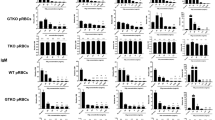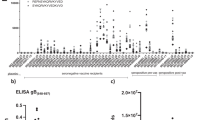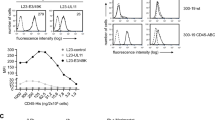Abstract
IT was indicated recently that simple neutralization of antigen cannot explain the suppression of immune response by passive antibodies. Moreover, the presence of the Fc fragment of the antibody molecule is required to obtain the inhibitory effect1. Because the Fc fragment is responsible for cytophilic binding of antibodies to macrophages2 or lymphoid cells3, I anticipated that cytophilic antibodies might be involved in the inhibition of the immune response and tested this by examining the immunosuppressive effect of a hyperimmune chicken antihuman serum albumin (HSA) serum deprived of cytophilic activity. The serum (50 ml.) was absorbed six times with calf spleen cells, which were previously washed four times with excess Hanks solution. At each absorption the serum was mixed with 5 ml. of packed cell sediment, incubated 60 min at 4° C and centrifuged 10 min at 1,500 r.p.m. The cell sediments were collected and resuspended in cold Hanks solution. After the last absorption, the pool of cells resuspended in 150 ml. Hanks solution without previous washing was incubated 60 min at 56° C, centrifuged and the eluate was concentrated to 50 ml. In all three preparations (original serum, absorbed serum and eluate) the titre of haemagglutinating antibodies and their cytophilic binding was determined by methods already described4,5. In the absorbed serum the titre of haemagglutination (see legend to Fig. 1) had dropped to 50 per cent of that in the original serum, whereas the cytophilic binding had dropped to 10 per cent of its original activity. In the eluate haemagglutinating antibodies had almost the same titre as in the original serum, but only about 10 per cent of the cytophilic binding was recovered.
This is a preview of subscription content, access via your institution
Access options
Subscribe to this journal
Receive 51 print issues and online access
$199.00 per year
only $3.90 per issue
Buy this article
- Purchase on Springer Link
- Instant access to full article PDF
Prices may be subject to local taxes which are calculated during checkout
Similar content being viewed by others
References
Sinclair, N. R. StC., J. Exp. Med., 129, 1183 (1969).
Berken, A., and Benacerraf, B., J. Exp. Med., 123, 119 (1966).
Uhr, J. W., Proc. US Nat. Acad. Sci., 54, 1599 (1965).
Iványi, J., Valentová, V., and Ĉerný, J., Folia Biol., 12, 158 (1966).
Boyden, S. V., and Sorkin, E., Immunology, 4, 244 (1962).
Rowley, D. A., and Fitch, F. W., J. Exp. Med., 120, 987 (1964).
Pierce, C. W., J. Exp. Med., 130, 365 (1969).
Henry, C., and Jerne, N. K., J. Exp. Med., 128, 133 (1968).
Hanna, M. G., jun., Nettesheim, P., and Francis, M. W., J. Exp. Med., 129, 953 (1969).
Author information
Authors and Affiliations
Rights and permissions
About this article
Cite this article
IVÁNYI, J. Cytophilic Antibodies in Passive Antibody Induced Immune Suppression or Enhancement. Nature 226, 550–551 (1970). https://doi.org/10.1038/226550b0
Received:
Accepted:
Issue Date:
DOI: https://doi.org/10.1038/226550b0
This article is cited by
-
Effect of specific antibodies on ability of antigen-loaded macrophages to induce an immunological response
Bulletin of Experimental Biology and Medicine (1974)
Comments
By submitting a comment you agree to abide by our Terms and Community Guidelines. If you find something abusive or that does not comply with our terms or guidelines please flag it as inappropriate.



